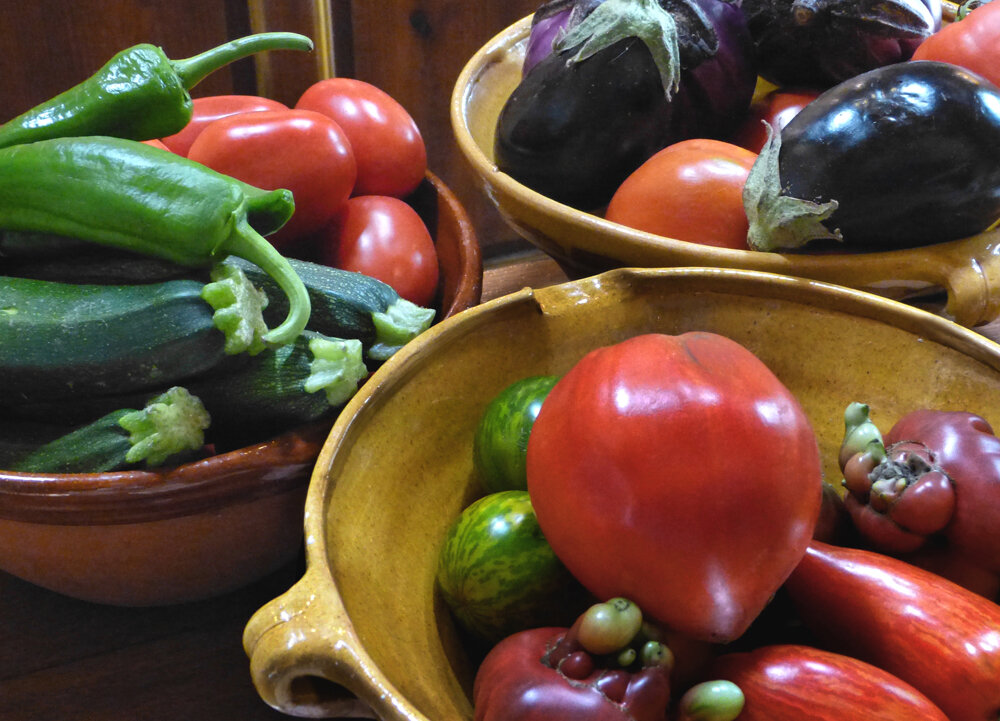I was once swept off my feet while vacationing in Italy, la terra di amore, the land of love. As I might have expected (as you by now might expect), my irresistible suitor was not a him but an it, the mercato, the Florentine farmers’ market. And the language of our courtship was curiously slanted toward all things edible: rosemario, pomodori, fagioli, aglio.
Blocks away in my Italian kitchen, I could feel the bustle and energy of the market. People streamed toward it from every direction—on foot, bicycle, or motorcycle—and I joined them each morning as I set out to gather ingredients for the day’s meals.
What the mercato offered was a vision; even now, it takes no effort to conjure it in my mind. Barrels of capers in salt. Anchovies. Artichokes. Fresh beans in their pods. Porcini mushrooms and handfuls of wild mint to go with them. More vegetables and fruit, full of color, odd shapes and personalities, and all at their peak of ripeness, the best and most they would ever be. There was rich, creamy yogurt that must have been a thousand calories. There were fresh whole fish that smelled of salt air and sea, squat yellow peaches, and eggs with deep golden yolks. Rather than pack these eggs twelve to a carton, the farmers offered them one by one, each a treasure.
My favorite moments at the mercato were when I needed herbs, aromatiques. The farmers treated them almost as weeds and gave them by the handful, choosing which herbs to offer based on what I bought. The assumption was that I would know what to do with them, that I knew how to cook, and I did because the ingredients spoke a language, not in words but by some otherworldly means, that told me how they wanted to be prepared. I had only to observe and respond, imposing little, and my meals never tasted so good.
As I reflect on the way I gathered food before my Italian adventure, I can point to an emptiness, to a missing story in vegetables neatly packed into grocery store bins, or in shrink-wrapped meat displayed on uniform refrigerator shelves. I knew nothing of the farmer, the farm, or the story behind this food.
Shopping at the mercato reminded me that food comes from some place and some one, that behind every bite we eat are hands and hearts that bring food from the fields so we can put it on the table. Behind every bite are stories that most of us have lost and that we can learn again by getting to know our farmers.
I realize that shopping at farmers’ markets may not be a way to restore anything we have actually lost. It may, in fact, imitate a slow-paced way of gathering and savoring food that was never an integral part of our food culture. I’m not sure. But knowing the animals who will provide, or become, our dinner is not new, and knowing the farmers who put seeds into the soil and pull vegetables out of it is not new either. Finally, enjoying the process of gathering food, and spending time doing it, has enriched us since the beginning of time.
Visiting a farmers’ market each week may not work for everyone, and it may not work all of the time, but it is possible, especially now and for most of us. If we make it a priority, we can participate in the process of reaping the harvest, and it’s worth it because where else can you find so many happy people engaged in food commerce: buying and selling, swapping recipes, and sharing details of the harvest? Where else can you inhale the aroma of fresh, beautiful ingredients while you shop? And where can you find more potent inspiration than from deliciously ripe, seasonal food?
Finding Love (Or a Farmers’ Market) Of Your Own
Farmers’ markets are increasing in number, with thousands spread across the country and many open year-round. Regardless of the season, farmers’ markets provide more than just food. By reorganizing the buying and selling of ingredients around fresh air and community, they add vitality and interest to a process that might otherwise be depleting. In contrast to supermarket shopping, farmers’ markets lift our spirits by connecting us to others and allowing us to exercise our right to choose food that’s wholesome, fresh, and nourishing.
To find a market near you, follow this link: Local Harvest. And if you feel like skipping the market and going straight to the farm, have a look at this site: Eat Wild.
Copyright, Ellen Arian, Ellen’s Food & Soul




